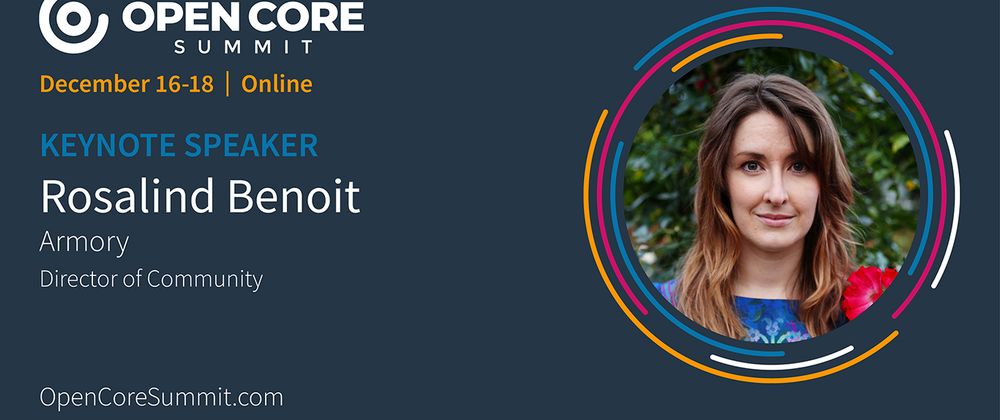Rosalind Benoit is Director of Community at Armory, where she works to enable and energize the Spinnaker ecosystem. Rosalind holds an MSIS in Database & Internet Technologies from Northwestern University. Her passion for enacting change via software comes from a varied background in system administration, engineering, project management, and education, along with a lifelong love of Linux. Forever a teacher and motivator, she focuses on improving the Spinnaker developer experience to facilitate contributions. As chair of the Continuous Delivery Foundation Outreach Committee, she seeks to improve the world’s capacity to safely deliver software with speed by giving everyone access to an optimized SDLC.
Relevant Links
LinkedIn - Twitter
Armory's Rosalind Benoit on the future of SDLC interoperability and how open source communities can drive both product value and a more equitable tech.
How does open source drive product value? — 00:19
“This has become my passion. For companies investing in fostering open-source communities, sometimes there is a perception that the goal is to get engineering support from the public, leverage free labor based on the cultural phenomenon of open source and the values that espouses, that sense of the greater good. Those values are real and important to people, but form a dollar and cents perspective, that’s not how you see value accruing to COSS companies. It takes a lot of thoughtful investment to actually see product value accruing directly from contributions.”
“Where I’ve seen this leveraged most successfully is when COSS companies investment in open source starts in product. When product strategy takes into account, or helps to shape and drive the open-source roadmap, you establish a relationship channel with the community.”
What's Armory's strategy for the Spinnaker plug-in framework in partnership with Netflix's GA? — 3:37
“Value prop is to foster a landscape around the tool that has an accessible interoperability framework.” Rosalind elaborates on details and features, and how this framework solves problems for users.
Could Lonne Jaffe's "neobundling" concept be applied to CI/CD? — 6:19
“For SLDC tools and platforms, a lot of the growth ahead is creating an open standard for interoperability, and not just for CI/CD, that higher-value abstractions can be built on. There isn’t really a standard now. There’s some exciting inertia behind standardizing with Tecton … but one of the things I’m seeing, the real value is generated for a platform/tool when all of these integrations that reduce context switching for engineers are being built and maintained. So the value is really found in that glue, that common glue, and there isn’t a standard for that. So we can imagine and start to build it … but the persistent complexity comes up, when you think about organizations that have multiple instances of the same tool, set-up differently … so there’s a lot of operational complexity around that. … That’s where, when you’re bundling from a product perspective, you have to take that into account. What is all the tech I have to account for in our estate, what is the degree of entrenchment around each one of those tools? This is where I see open source faced with an incredibly hard problem. As Lonne says, how can we agree at one layer around interoperability problem, to give users freedom to decide which platforms they want to use to consume, manage, and visualize workflows.”
How can open source play a role in building a more equitable technology ecosystem and space? — 10:15
“First step is asking the question, so thank you so much for asking it.”
“I’ve seen open source change a lot, since being an 8-year-old playing with a Fedora project.”
Rosalind speaks about evolution of open-source ethos and the importance of that evolution, highlighting some of the problems in communities stemming from fear of asking for help and making naive proposals.
“Let’s evolve open source into a thing where we’re optimizing for becoming greater than the sum of the parts, and we’re proud of the fact that we’re standing on each other’s shoulders. … We lead with what’s human, with what’s shared, and that means there are no stupid questions.”
“I also think the concept of privilege needs to be reconciled with the ethos of open source. If everyone’s not starting from the same place, with the same context and access to resources that are required to explore OSS technologies, then OSS is no more of a level playing field than anything else in our society. We can’t pretend that. That’s one more reason to say, it’s time to move beyond exclusionary attitudes and that ‘pulling yourself up by your bootstraps’ mentality (which is really a fallacy) … If we can evolve beyond that, then open source has the potential to be an amazing launchpad for all these incredibly talented, underrepresented folks who are seeking opportunity now.”
Rosalind also highlights relationship with Nikema Prophet, Armory’s Community Marketing Manager. “We talk a lot about building inclusive communities, because it’s her passion and it’s a big area of opportunity.”
Rosalind cites a quote from Nikema. “I’m fired up about leveraging existing and emerging technology to enhance human lives. For me, tech is all about the people it touches. I never want to forget about the human costs and consequences of what we create. A poor contributor experience repels people who have a lot to offer. When people aren’t sure they’re welcome, diversity suffers. I want to do everything in my power to prevent that from happening, and to make our corner of open source (Spinnaker) a place that people want to return to again and again.”
Share your questions and comments below!



Top comments (0)